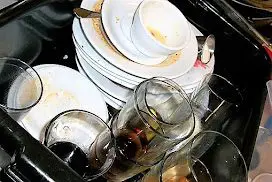There’s the James Beard Award for chefs. Celebrity chefs like Rachel Ray and Guy Fieri show off their talents on TV. Famous cooking competitions are refereed by Gordon Ramsey and other culinary stars. But as far as I know, there are no celebrity dishwashers, no dishwashing TV shows, no dishwashing competitions that bring fame and fortune to the winners.
But there should be. There should be an award.
Cooking is considered a highly skilled occupation, a calling, an art. But dishwashers are taken for granted, if they’re lucky, otherwise they’re abused and forgotten.
But how would you like to go to a restaurant, and find old cheese hardened onto the side of your plate? Or bits of broccoli stuck to the tines of a fork, or some unidentifiable brownish stain on the bottom of your glass?
No. Dishwashers do not get the credit they deserve.
I know, because I’m the dishwasher in the family. And let me tell you, it is an underrated job that requires a lot more skill than people realize.
 |
| Before |
“Oh, what are you talking about?” people say to me. “You just stick the dishes in the dishwasher. They get clean!”
Well, I don’t know how to answer these people, except to say that they are no-talent dishwashing hacks!
First of all, not everyone has an automatic dishwasher. So you have issues involving brushes and sponges, water temperature, dish sequencing, length and strength of scrubbing . . . and more.
But most of us do have a dishwasher. And like most modern conveniences, that only makes things more complicated.
First, there’s the sorting process. You have to decide what can go in the dishwasher. Some pots and pans are too big. Special serving platters and cut-glass bowls are forbidden by the lady of the house to undergo the trials and tribulations visited upon dishes by the electric dishwasher.
Then, where do the larger glasses go, where can you fit the smaller ones? Which knives and forks go straight up, which go pointy end down? (A sharp knife must go point down, unless you want to stab your finger and make a trip to the ER.) That is, unless you have a top rack, in which case sharp instruments go up there.
You see? It’s more complicate than you think. I know, because I learned my dishwashing skills at the foot of my father. When I was a little boy, my older sister had the job of doing the dishes . . . my job was clearing the table. After my sister went to college, my dad took over . . . until my mother retired my father and promoted me to chief bottle washer.
 |
| After |
Later, I honed my skills in college. I lived off campus in a rowhouse with five other guys. Two of them cooked. Three of us took turns doing cleanup.
After college, and a couple of difficult years with a proudly messy roommate, I moved into my girlfriend’s apartment. She was a cook. So my dishwashing skills came in handy . . . and were much appreciated. So much so that we got married!
Anyway, enough of my personal history. The bottom line is that I am somewhat of an expert at washing dishes — how to sort, when to rinse and when you don’t have to rinse, how to rinse efficiently, how to position the dishes in and around the racks, how to deal with specialty items. And finally, the best way to unload the dishwasher.
And if you think it doesn’t matter how you empty the dishwasher . . . well, clearly you have a few things to learn. Which brings me to my point about getting dishwashers the credit they deserve.
I’m proposing an award for dishwasher of the year. The Soapy Award and the Sudsy Award have both already been claimed by soap operas. So our award could be . . . The Squeaky.
Unless you have a better idea for a name. And meanwhile, don’t be shy about nominating a candidate for the award from your own life. We dishwashers need some recognition.
Notifications